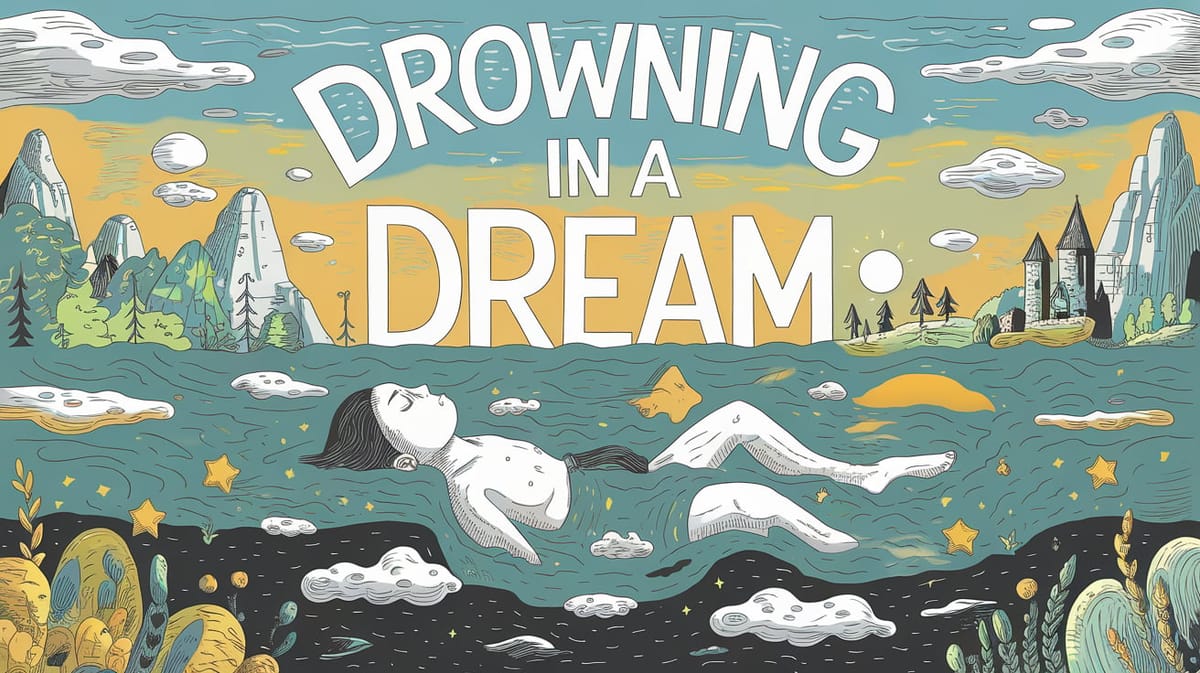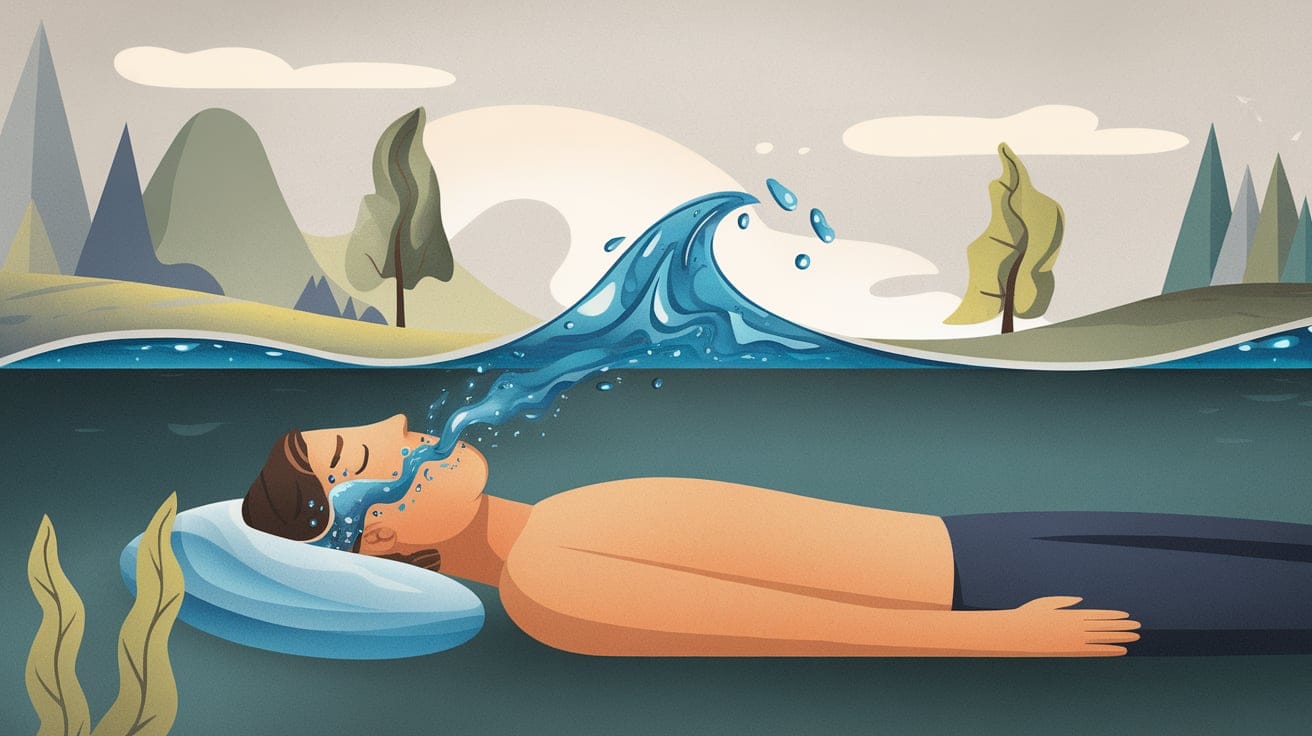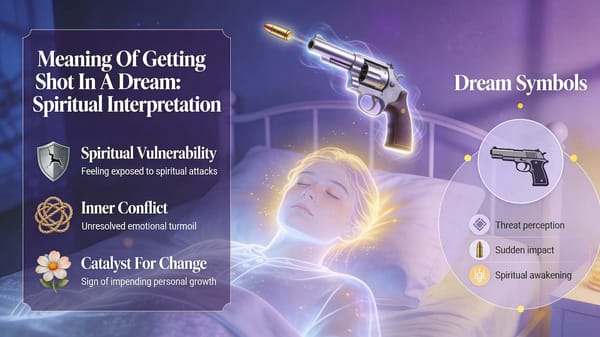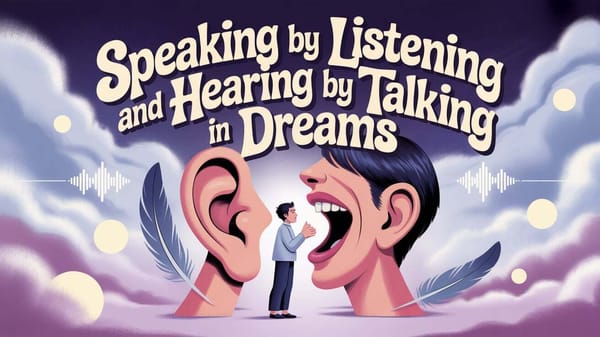Drowning in a Dream: Understanding the Meaning and Interpretation

Imagine this: the world around you fades to an echo and you feel the undeniable pull of water encompassing you, drawing you deeper and deeper into an infinite abyss. Drowning, perhaps one of the most unsettling dream scenarios, rouses ancient fears and fills the sleeper with a desperate urgency. What if these dreams hold a key to understanding the labyrinth of our subconscious? Across cultures and time periods, dreams of drowning have been steeped in mystery and contemplation, suggesting moments of transformative crises or profound emotional upheavals. In our journey to uncover the secrets of these enigmatic dreams, we explore their symbolic depths, psychological nuances, and scientific observations, revealing a mosaic of meaning that might just turn these night terrors into enlightening experiences.

The Symbolic and Spiritual Significance of Drowning
Drowning, when considered through the lens of symbolism and spirituality, enchants us with its dual nature of destruction and rebirth. Water, a quintessential symbol of the subconscious and emotional depths, represents both the nourishing aspect of life and the uncontainable force of nature. Drowning in a dream signifies the sensation of being overwhelmed or consumed by emotions, hinting at a period where the dreamer's feelings are unbridled and possibly unaddressed. As an element that connects with both intuition and mystery, the act of drowning might also relate to circumstances that demand introspection and the reevaluation of one's life's direction. This could be a time when the dreamer is forced to confront hidden fears or desires that have been submerged for too long.
In spiritual contexts, drowning can echo the archetypal journey of the hero — an ordeal into the dark waters leading to eventual triumph and enlightenment. It is said to cleanse, allowing for the dissolution of the ego and the rebirth of the self imbued with newfound wisdom and clarity. For the dreamer, this might reflect a time of significant personal transformation or a call to embrace one's fears and harness the power of vulnerability as they navigate life's turbulent waters.
What Do Different Drowning Scenarios Mean?
Dreams of drowning can vary dramatically, each scenario offering its own interpretation:
- Drowning Alone: This situation might mirror feelings of isolation or helplessness, suggesting that the dreamer is battling personal struggles without perceived support from others. It can indicate a solitary journey toward addressing internal chaos or unresolved emotional conflicts.
- Rescuing Someone from Drowning: Such a scenario may highlight the dreamer's nurturing instincts or an overwhelming responsibility toward others. It could underscore a desire to protect and save someone from emotional turmoil or could reflect personal cross-currents of duty and care.
- Drowning in a Natural Disaster (e.g., Tsunami or Flood): Here, the dream takes on apocalyptic undertones, indicating large-scale change or an unstoppable force of nature. The dreamer might be facing unavoidable shifts in their life, urging them to relinquish control and adapt to new circumstances.
- Drowning with Loved Ones: The presence of loved ones in drowning scenarios can denote shared anxiety or collective transformation. It reflects interconnected emotional dynamics, urging exploration of the relationships and ties that bind the dreamer.
Psychological Interpretations of Drowning
From a psychological standpoint, several schools of thought offer differing insights into the dream of drowning:

- Freudian Interpretation: Sigmund Freud would likely focus on repression, suggesting that drowning symbolizes repressed emotions or unresolved issues that are suffocating the conscious mind. It might be a manifestation of guilt, fear, or internal conflicts surfacing metaphorically through the dream.
- Jungian Perspective: Carl Jung might interpret drowning as a confrontation with the Shadow, where the dreamer is engulfed by parts of the self that have been ignored or denied. The process of drowning can symbolize the integration of these neglected aspects, an especially transformative experience of individuation.
- Reiki Viewpoint: In Reiki and other energy healing traditions, dreams of drowning could be seen as indications of energy imbalances, particularly related to the heart or throat chakras, which govern emotions and communication. Addressing these imbalances might be key to unlocking the nature behind the dream.
Common Causes and Factors Behind Drowning
Understanding the common triggers for drowning dreams can offer pragmatic insights:
- High Levels of Stress: Ongoing stress or pressure can manifest in dreams as an overwhelming sensation of being engulfed, mirroring the mental and emotional strain felt when awake.
- Significant Life Changes: Major transitions or unanticipated shifts can catalyze dreams of drowning, where the fear of the unknown becomes a metaphorical plunge into uncertainty.
- Emotional Overload: When emotions are not expressed or addressed, they can storm into consciousness through drowning dreams, urging the dreamer to face their feelings.
- Unresolved Conflicts: Lingering conflicts in relationships or personal affairs can surface in this manner, symbolizing the need for resolution and clarity.
Scientific Explanations for Drowning in Dreams
From a scientific stance, several theories provide insight into such dreams:

- Physical Sensations: During sleep, the sensation of breathlessness or pressure (often linked to sleep apnea) might trigger the imagery of drowning as the brain attempts to make sense of what's happening physiologically.
- Neurological Factors: Some researchers propose that distressing dreams, such as drowning, might reflect brain chemistry and neural processing that involve fear response pathways being activated during specific sleep cycles.
- Sleep Disturbances: Irregular sleep patterns, health anxieties, or nightmares can contribute to the occurrence and vividness of drowning dreams.
Coping Strategies for Drowning in Dreams
To help manage and potentially mitigate these unsettling dreams, consider the following strategies:
- Keep a Dream Journal: Capturing the details and emotions associated with your dreams can offer clarity and highlight recurring themes warranting attention.
- Seek Professional Counseling: If drowning dreams are persistent or particularly distressing, discussing them with a therapist can uncover underlying issues and facilitate healing.
- Stress Reduction Techniques: Engaging in meditation, yoga, or mindfulness practices can help alleviate stress and lead to more restful sleep, potentially reducing the frequency of anxiety-driven dreams.
- Evaluate Life Changes: Consider recent upheavals or decisions in your life that might contribute to the sensation of being overwhelmed. Reflecting on these aspects can foster self-awareness and acceptance.
Summary & Final Thoughts
Dreams of drowning, while alarming and often perplexing, offer us a profound glimpse into the depths of our unconscious minds. They invite introspection and self-exploration, serving as an eerie yet clarifying reflection of our waking fears, desires, and emotional landscapes. By dissecting these nocturnal narratives through symbolic, psychological, and scientific lenses, we open ourselves to greater understanding and control over the unseen tides that shape our destinies. So, the next time you find yourself submerged in such dreams, consider their lessons and embrace the opportunity they present for transformation and healing. The waters may be deep, but the secrets they guard are yours to uncover.
FAQ: Navigating the Depths of Drowning Dreams
What is the spiritual meaning of drowning in a dream?
Drowning in a dream is often interpreted as a sign of being overwhelmed by emotions or life circumstances. It suggests a period of intense emotional turmoil or feelings of being consumed by the subconscious. Spiritually, it can symbolize a transformative crisis or an opportunity for personal growth and rebirth, where confronting fears leads to newfound wisdom.
How can drowning be viewed as both destruction and rebirth?
Water is a powerful symbol of the subconscious and emotional depth, representing both the nourishing and destructive forces of nature. Drowning in a dream reflects this duality, indicating that while it may signify an overwhelming emotional experience, it also serves as a symbolic death of the ego, paving the way for personal transformation and rejuvenation.
What do different drowning scenarios in dreams signify?
- Drowning Alone: Reflects feelings of isolation, personal struggles, or unresolved emotional conflicts without perceived support.
- Rescuing Someone from Drowning: Highlights nurturing instincts or overwhelming responsibilities, pointing to a desire to support others emotionally.
- Drowning in a Natural Disaster: Indicates large-scale change or unavoidable life shifts, urging adaptation and relinquishing control.
- Drowning with Loved Ones: Denotes shared anxiety or collective transformation, emphasizing interconnected emotional dynamics.
What are psychological interpretations of drowning dreams?
- Freudian Interpretation: Drowning represents repressed emotions or unresolved issues affecting the conscious mind.
- Jungian Perspective: Seen as a confrontation with the Shadow, representing integration of neglected aspects for personal growth.
- Reiki Viewpoint: Indicates energy imbalances related to emotional and communicative aspects, particularly the heart or throat chakras.
What are common causes and factors behind drowning dreams?
- High Levels of Stress: Represents emotional overwhelm or mental strain.
- Significant Life Changes: Reflects fear of the unknown or major transitions.
- Emotional Overload: Urges the dreamer to confront unexpressed emotions.
- Unresolved Conflicts: Symbolizes the need for resolution in personal or relational matters.
What scientific explanations are there for drowning dreams?
- Physical Sensations: Conditions like sleep apnea may cause sensations that trigger drowning imagery.
- Neurological Factors: Fear response pathways activated during sleep may lead to distressing dreams.
- Sleep Disturbances: Irregular sleep habits or anxiety may enhance the intensity and frequency of such dreams.
What are effective coping strategies for drowning dreams?
- Keep a Dream Journal: Document dreams to identify recurring themes and emotions.
- Seek Professional Counseling: Therapy can uncover underlying issues and promote healing.
- Stress Reduction Techniques: Practices like meditation or yoga can reduce stress and improve sleep quality.
- Evaluate Life Changes: Reflect on recent upheavals to foster self-awareness and acceptance.
What is the overall message or benefit of interpreting drowning dreams?
Drowning dreams, although unsettling, provide an insightful look into our unconscious minds and serve as a reflection of our waking fears and desires. By understanding these dreams through symbolic, psychological, and scientific perspectives, individuals can gain clarity, embrace transformation, and navigate their emotional landscapes with greater awareness and control.




